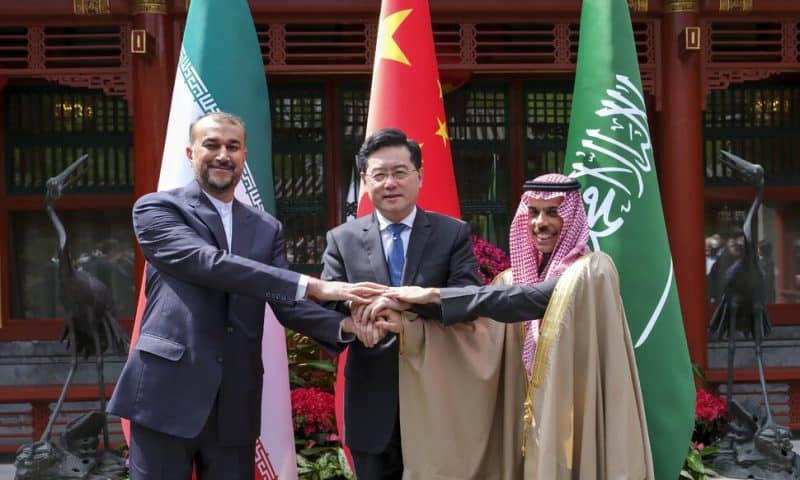The kingdom is charting its own energy and foreign policy.
After Saudi Arabia earlier this week led a group of oil producing nations to agree to a coordinated cut in output totaling more than 1 million barrels a day, analysts scrambled to say whether it was a slap at the Biden administration, cozying up to China or simply the Gulf nation protecting its own interests.
The move caught most observers off guard and prompted a quick dismissal from President Joe Biden on Monday, who said “It’s not going to be as bad as you think.” Still, the news sent Brent crude, the international benchmark, to $85 a barrel up from the $75 range it had been trading at only 10 days earlier.
A Poke in the Eye
As a candidate for president in 2020, Biden had vowed to hold the kingdom accountable for the death of journalist Jamal Khashoggi, who U.S. intelligence services believe was brutally murdered with the approval of Crown Prince Mohammed bin Salman. Yet in the summer of 2022, with inflation raging and gasoline prices above $5 a gallon, Biden traveled to Jeddah and famously “fist bumped” the Saudi leader even as the president denied he was begging the Saudis to produce more oil. Three months later, the Saudis cut production.
The recent decision of the Biden administration to forgo refilling the Strategic Petroleum Reserve as oil prices fell may also have played into the Saudi calculation. As the price of oil trended below the $80 a barrel mark, Saudi revenues took a beating and, as the country is one of the largest, low-cost producers of oil, it exerts enormous control on the global price of the liquid gold. The recent banking crisis in the U.S. and enhanced fears of a recession that could slow global growth no doubt added to concerns in Jeddah.
“That was a strategic mistake by the Biden administration,” says Cindy Beaulieu, managing director and portfolio manager at Conning. “The geopolitical situation with oil is getting interesting.”
The China Syndrome
But while it fits an easy narrative of the Saudis sending Biden a middle-finger salute, the reasoning behind the move may have explanations that have as much to do with Saudi Arabia’s changing geopolitical standing and its own domestic needs.
Saudi Arabia, along with many other countries that saw the world in terms of a struggle between global superpowers America and the Soviet Union during the Cold War era, is now seeking friendships outside of a duopoly based on military might.
“This latest round of OPEC 2.0 production cuts is an aggressive preemptive response to price weakness potentially arising on the supply side,” BCA Research wrote on Tuesday after the announcement. “It is, we believe, meant to counter the aggressive monetary policy moves by systemically important (central banks) led by the Fed, and a lack of follow-through on re-filling the US SPR, which the Biden Administration appears to be walking back.”
“The latest action by (the Kingdom of Saudi Arabia) dramatically highlights the evolution of KSA’s economic political policy shift, which, first and foremost, now prioritizes Saudi interests,” BCA added. “This will further widen the rift between KSA and the US.”
Saudi Arabia is embarked on a massive modernization and is increasingly reliant on money and technical support from China. That has only intensified in the wake of Russia’s invasion of Ukraine and recent moves by China to act as a peacemaker between those two nations.
Case in point: On Thursday, the foreign ministers of Saudi Arabia and Iran met in Beijing where they began setting plans for reopening embassies and consulates in each other’s country for the first time since 2016. The two countries restored diplomatic relations last month, in a deal brought about with China’s help.
“The meeting represents a significant victory for China’s foreign policy, while it does not yet signal a clear path in terms of pricing pressure on oil,” said Roberta Caselli, commodities research analyst at Global X, a provider of exchange-traded funds.
Back to $100?
Some oil experts are predicting oil could rise to $100 a barrel with the Saudi-led cutbacks due to take effect in May, just ahead of the peak gasoline demand amid the summer driving season in the U.S. But recent economic data – from rising unemployment claims, a manufacturing sector that is contracting and falling bond yields – has many predicting a recession in the U.S. this year.
That would bring demand for energy down, or at least keep it rising as much as might be expected with a growing economy. On Thursday, the government revised its weekly unemployment claims data showing that the labor market may have begun softening earlier than originally expected.
Allianz Trade North America Senior Economist Dan North has been warning the Federal Reserve’s extraordinary tightening of monetary policy through rapid increases in interest rates would eventually tip the economy into a recession.
“Weekly jobless claims have been rising for eight weeks and now stand at the highest level since the second week of January,” North said on Wednesday.
North also points to declines in job openings that, along with weakness in hiring picked up by private job firms such as ZipRecruiter and others, signaling an end to the hiring boom. Meanwhile, he says, “Layoffs continue to rise and the (Institute of Supply Management) manufacturing report shows that the employment component is well into contractionary territory, falling from 49.1 to 46.9 in March.”
Beyond the job market, North points to a decline in consumer spending for three out of the last four months and the recent banking crisis as reasons for hiring to be slowing down.
All told, the softening in the labor market – often seen as one of the last sectors of the economy to roll over before a recession – could dampen demand for oil as the year rolls on.
That could also have been on the radar of the Saudis as they moved to surprise – and buttress markets – this week.

